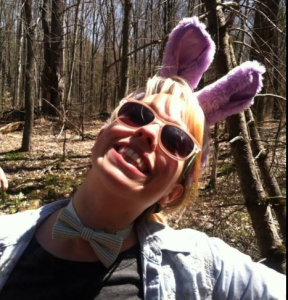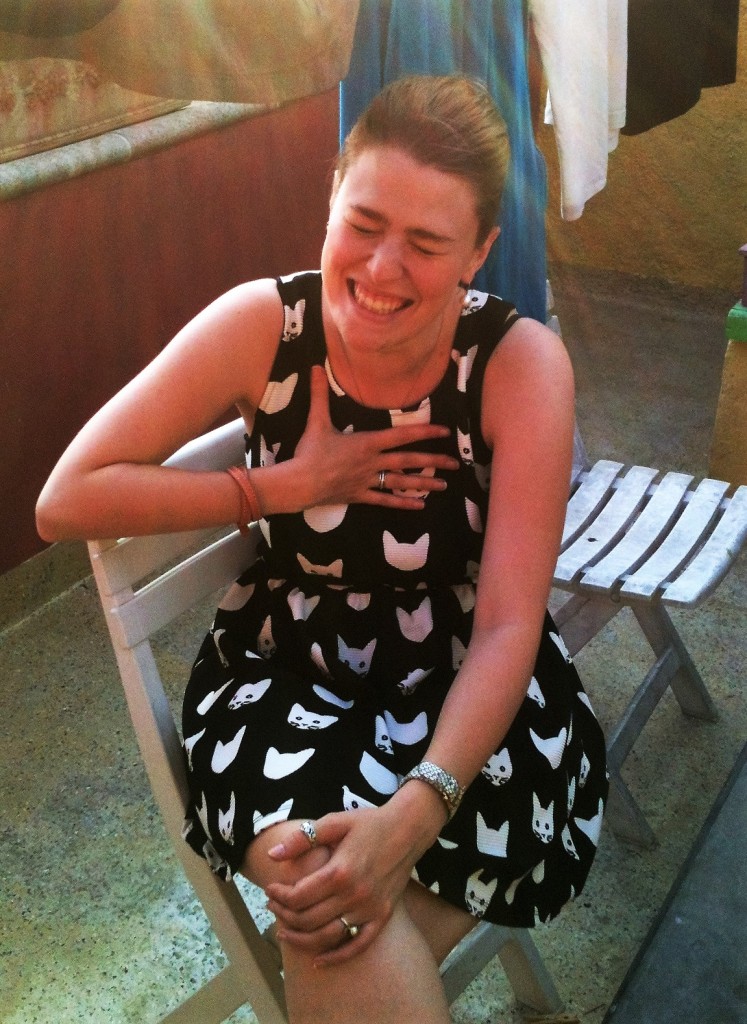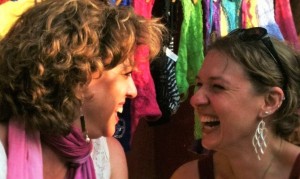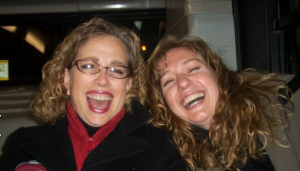The combination was laughingly almost lethal: one ridiculously funny friend + a beach trip to stay in a trailer + old crazy stories to prime the pump + a discussion of why Vespas in Italy are sexy but mopeds in Myrtle Beach are not. I had to pull off the road because I couldn’t see for all the tears of laughter—not to mention I was nearly doubled-over laughing trying to drive. Plus, I get weak and limp when laughing that hard—I could no longer hold the wheel. And one shouldn’t drive with her friend (ahem….Maxine) balled up in a puddle of hilarity on the floorboard! Maybe it’s the trailer at the beach that creates the grown-up playground because a different trip there yielded 2 ridiculous boyfriends driving to the coffee shop on a golf cart in their bathrobes! Nonsensical, for sure!
I may not be the world’s funniest person but I surround myself with friends who could certainly qualify. And, I love to laugh, so that’s a pretty smart strategy on my part. (Cue up Mary Poppins again—apparently she had a pretty profound impact on my formative years! –see Skill #20.) Because I love to laugh, I need plenty of time to play. For me, it’s the perfect antidote to working hard and for the sometimes hard work that I do.
I need plenty of time to play. For me, it’s the perfect antidote to working hard and for the sometimes hard work that I do.
Sadly, many adults believe play is a thing of childhood. When I was in college, I worked at a local hospital and they brought in a consultant whose goal was to improve workplace morale and she focused largely on the importance of continuing to play as an adult. I remember thinking how intuitively OBVIOUS that was and wondering how I could get paid for that kind of job! Her point was that play improves peoples’ overall sense of well-being but that many adults misunderstand what it means to play–most think of playing as a tennis match or any other competitive sport but that’s not really how ‘play’ is defined.
 Stuart Brown, psychiatrist, author (Play, 2009), researcher, and Founder of the National Institute for Play, defines play as “a state of being” that is “purposeless, fun and pleasurable.” Playing a competitive sport has a goal. Authentic play is not goal-directed but focuses on the overall experience. Furthermore, Brown says play is not a trivial matter but is necessary for healthy development. He stumbled across the significance of play when researching the life stories and personality characteristics of murderers in a Texas prison and found that their childhoods lacked play. In fact, Brown later found that creative, successful people have rich play lives.
Stuart Brown, psychiatrist, author (Play, 2009), researcher, and Founder of the National Institute for Play, defines play as “a state of being” that is “purposeless, fun and pleasurable.” Playing a competitive sport has a goal. Authentic play is not goal-directed but focuses on the overall experience. Furthermore, Brown says play is not a trivial matter but is necessary for healthy development. He stumbled across the significance of play when researching the life stories and personality characteristics of murderers in a Texas prison and found that their childhoods lacked play. In fact, Brown later found that creative, successful people have rich play lives.
Play is a state of being that is purposeless, fun and pleasurable — S. Brown
Similarly, laughter is often overlooked as a vital part of life. Research has investigated what happens when we laugh (muscle contractions that promote deep breathing patterns and the subsequent release of endorphins); it has clearly shown us how we benefit from laughter (increases pain tolerance, decreases the consequences of stress, and offsets the impact of negative affect and tension); but why we developed laughter as a species is more elusive.
Robert R. Provine, psychologist and neuroscientist, author of Laughter (2000), notes that it is both social and contagious. We first begin to laugh as infants as young as about 3 months old as one of our first preverbal ways of interacting with others. It’s deemed contagious because even the sound of laughter can make us laugh.
My father once demonstrated this unique talent: He could make us all break out laughing by simply laughing himself. I assure you, his was no fake laugh. Somehow, he could begin to belly laugh in a way that always left me wondering what he was conjuring up in his head to laugh that wholeheartedly and genuinely. It mattered not because we were all reduced to puddles of shared merriment.
Play and laughter bring joy and bond people. Most of us could use more joy and bonding.
Robin Dunbar, an evolutionary psychologist from Oxford (read more here), finds that laughter fosters closeness and promotes social bonding. He believes that it plays an important role in the social evolution of groups as the interactions required grew in complexity. Dunbar concludes that laughter smooths barriers when interactions are tense or even conflictual. John Gottman, psychologist and marriage researcher (previously cited in Skill #2), confirms that humor is an important tool in managing conflict in relationships.
A simple behavioral analysis of this skill could be—If we laugh and play with the people we love, we will develop more positive associations in that relationship. Positive memories, even in the face of hardship, help us create meaning in our lives.
That positive, warm, humorous spin on events helps us maintain perspective. Drs. Brown and Gottman both state that playing together helps couples rebuild emotional intimacy in their relationships. I saw this play out on a training trip to Italy. One of our colleagues only recognized the night before leaving that his wife’s passport had expired. With a lot of scrambling, money, and a delayed departure, alone, two days behind the group, she finally arrived. Her frustration with her husband was layered in humor and it quickly made for a “great story” as our mantra on the trip became tragedy plus time equals comedy. Laughing at these kinds of debacles can repair hard feelings.
If we laugh and play with the people we love, we will develop more positive associations in that relationship.
Play and laughter bring joy and bond people. Most of us could use more joy and bonding. There are plenty of “check books and toilets” (as a client once said) in our relational lives—issues that often disgruntle and divide us. In fact, it’s easy to get stuck in the “business of life”; but keep in mind that play and laughter are very important business in our emotional lives. As Stuart Brown succinctly says, “Play is the purest expression of love.”
So, Play More and Laugh More because Life is Messy and Life is Marvelous.
Rhea
Photo note: My laughing companion in the pictures is my dear friend and colleague, Sarah, with whom I’ve had many miles of laughs traveling abroad for professional trainings, first in Italy (in winter below) and later in France (in summer above). The others are silly daughters, Number One and Number Two–always a great source of play and laughter!




